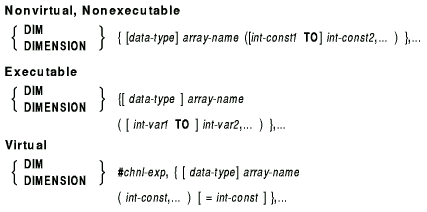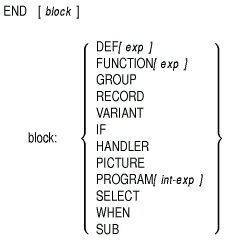| Previous | Contents | Index |
The DIMENSION statement creates and names a static, dynamic, or virtual array. The array subscripts determine the dimensions and the size of the array. You can specify the data type of the array and associate the array with an I/O channel.

DIM #1, STRING vir_array(100) = 12 OPEN "STATS.BAS" FOR OUTPUT as #1, VIRTUAL |
%BASIC-W-STRLENINC, virtual array string VIR_ARRAY length increased from 12 to 16 |
DIM #1, A(10) DIM #1, B(10) |
!Nonvirtual, Nonexecutable DIM STRING name_list(20 TO 100), BYTE age(100) |
!Virtual DIM #1%, STRING name_list(500), REAL amount(10,10) |
!Executable DIM DOUBLE inventory(base,markup) . . . DIM DOUBLE inventory (new_base,new_markup) |
The ECHO function causes characters to be echoed at a terminal that is opened on a specified channel.

Chnl-exp must specify a terminal.
DECLARE INTEGER Y, &
STRING pass_word
Y = NOECHO(0%)
SET NO PROMPT
INPUT "Enter your password: ";pass_word
Y = ECHO(0%)
IF pass_word = "Darlene"
THEN
PRINT CR+LF+"YOU ARE CORRECT !"
END IF
|
Output
Enter your password? YOU ARE CORRECT ! |
The EDIT$ function performs one or more string editing functions, depending on the value of its integer argument.

None
| Value | Edit Performed |
|---|---|
| 1 | Discards each character's parity bit (bit 7) |
| 2 | Discards all spaces and tabs |
| 4 | Discards all carriage returns <CR>, line feeds <LF>, form feeds <FF>, deletes <DEL>, escapes <ESC>, and nulls <NUL> |
| 8 | Discards leading spaces and tabs |
| 16 | Converts multiple spaces and tabs to a single space |
| 32 | Converts lowercase letters to uppercase letters |
| 64 | Converts left bracket ([) to left parenthesis [(] and right bracket (]) to right parenthesis [)] |
| 128 | Discards trailing spaces and tabs (same as TRM$ function) |
| 256 | Suppresses all editing for characters within quotation marks; if the string has only one quotation mark, BASIC suppresses all editing for the characters following the quotation mark |
DECLARE STRING old_string, new_string old_string = "a value of 32 converts lowercase letters to uppercase" new_string = EDIT$(old_string,32) PRINT new_string |
Output
A VALUE OF 32 CONVERTS LOWERCASE LETTERS TO UPPERCASE |
The END statement marks the physical and logical end of a main program, a program module, or a block of statements.

None
10 INPUT "Guess a number";A%
IF A% = 24
THEN
PRINT, "YOU GUESSED IT!"
END IF
IF A% < 24
THEN
PRINT, "BIGGER IS BETTER!"
GOTO 10
END IF
IF A% > 24
THEN
PRINT, "SMALLER IS BETTER!"
GOTO 10
END IF
END PROGRAM
|
The ERL function returns the number of the BASIC line where the last error occurred.

The value of int-var returned by the ERL function is a LONG integer.
10 DECLARE LONG int_exp
WHEN ERROR USE error_routine
20 INPUT "Enter an integer expression";int_exp
30 PRINT DATE$(int_exp)
END WHEN
HANDLER error_routine
IF ERL = 20
THEN
PRINT "Invalid input...try again"
RETRY
ELSE
PRINT "UNEXPECTED ERROR"
EXIT HANDLER
END IF
END HANDLER
END PROGRAM
|
Output
Enter an integer expression? ABCD Error occurred on line 20 Enter an integer expression? 0 07-Feb-00 |
The ERN$ function returns the name of the main program, subprogram, or DEF function that was executing when the last error occurred.

None
10 DECLARE LONG int_exp
!This module's name is DATE
WHEN ERROR IN
INPUT "Enter an number";int_exp
USE
PRINT "Error in module ";ERN$
RETRY
END WHEN
PRINT Date$(int_exp)
END
|
Output
Enter a number? ABCD Error in module DATE Enter a number? 0 07-Feb-00 |
The ERR function returns the error number of the current run-time error.

The value of int-var returned by the ERR function is always a LONG integer.
If the ERR function is used before an error occurs or after an error is handled, the results are undefined.
10 DECLARE LONG int_exp
WHEN ERROR USE error_routine
20 INPUT "Enter an integer expression";int_exp
PRINT DATE$(int_exp)
END WHEN
HANDLER error_routine:
PRINT "Error number";ERR
IF ERR = 50 THEN PRINT "DATA FORMAT ERROR"
ELSE PRINT "UNEXPECTED ERROR"
END IF
RETRY
END HANDLER
END
|
Output
Enter an integer expression? ABCD Error number 50 DATA FORMAT ERROR Enter an integer expression? 0 07-Feb-00 |
The ERT$ function returns explanatory text associated with an error number.

Int-exp is a BASIC error number. The error number should be a valid BASIC error number.
10 DECLARE LONG int_exp
WHEN ERROR USE error_routine
20 INPUT "Enter an integer expression";int_exp
PRINT DATE$(int_exp)
END WHEN
HANDLER error_routine
PRINT "Error number";ERR
PRINT ERT$(ERR)
RETRY
END HANDLER
END
|
Output
Enter an integer expression? ABCD Error number 50 %Data format error Enter an integer expression? 0 07-Feb-00 |
| Previous | Next | Contents | Index |